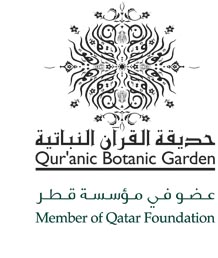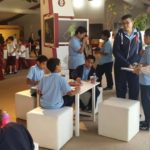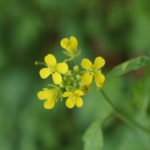Qur’anic Botanic Garden in Doha, Qatar
Country: Qatar

- NAME Qur’anic Botanic Garden
- ADDRESS Education City Qatar Foundation. Al-Laqta St. P.O.Box 5825 Doha State of Qatar.
- WEBSITE https://www.qf.org.qa/community/quranic-botanic-garden-qbg
- EMAIL QBG@QF.ORG.QA
- PHONE +974 44548301
- OPENING HOURS No open to Public yet. (Under construction).
- OWNERSHIP Qatar Foundation
- DIRECTOR Fatima bint Saleh Al-Khulaifi
- FACILITIES Herbarium, Arboretum, Seed Bank, Published Plant Catalogue. Laboratories. Disabled access selected Computer Plant Record System, Sponsorship Programmes. Shop, Cafeteria.
- AREA (IN SQM) 22,000 M2 including facilities
- NUMBER OF SPECIES 61
- COLLECTIONS https://www.youtube.com/channel/UC8_7ppPlPexR2fh7ovSNEuA
- CONSERVATION PROGRAMMES The conservation and agriculture strategy of the Qur’anic Botanic Garden (QBG) has two main pillars; Ex-Situ and In-Situ Programs. The Ex-Situ conservation program of the QBG is including production of plants inside the QBG nursery. The Garden was able to increase the number of saplings inside the QBG nursery for the preservation purposes, educational and planting “Ghars” campaigns. The Garden is coordinating with the national entities in Qatar (e.g. Ministry of Environment) to increase the number of plants of the QBG using the tissue culture technologies. Furthermore, the QBG’s Ex-Situ conservation program is preserving the QBG’s plants herbarium specimens and seeds and helping in collect seeds and herbarium for the indigenous plant species of Qatari flora. QBG is coordinating with national institutes (e.g. Ministry of the Environment and Qatar University) to enrich the national plant gene bank. The In-Situ Conservation program is including an ecological studies e.g. Surveys, assessments and GIS mapping, of recorded plants of the QBG in Qatar and those indigenous plants of the Flora of Qatar.
- RESEARCH PROGRAMMES Qur’anic Botanic Garden is collaborating with national and international institutions in terms of research and exchange of relative information to the scope of plants. In Qatar, there are multiple programs with Qatar Faculty of Islamic Studies (QFIS) in Hamad bin Khalifa University, Agriculture Research Department of Ministry of Environment and Qatar National Protected Areas Authority. In international scale, QBG is cooperating with many distinguished professors in the fields of botany, horticulture, conservation and ecosystem management. On April 2014, the garden and IUCN’s Commission on Ecosystem Management have conducted the 2nd International Forum of the Qur’anic Botanic Garden entitled “Islamic Perspectives on Ecosystem Management”.
- EDUCATION PROGRAMMES The main goal of Educational Program of the Qur’anic Botanic Garden is to produce basic and applied information about plants especially the Qur’anic Botanic Garden’s plants and related topics based on conservation and cultural heritage. Our education programs, Horticulture and conservation programs, dissemination activities, and partnerships are fundamental in ensuring the transfer of our knowledge to the global community. The QBG is cooperating with multiple schools in Qatar from different educational categories e.g. primary, and secondary schools (ages from 6 to 12). A simplified curriculum about “Botanical Garden” had been parped by garden specialists, and then presented to students in the form of lectures and interactive activities, competitions and interactive games. The educational program is including visits to fields and greenhouse, planting seeds and learns about conditions for germination, and agricultural soils, Herbarium. Also, the program focus to teach students about the botanic museums and items displays to preserve the cultural heritage.
The Qur’anic Botanic Garden in Qatar is the first of its kind in the world. It is a new concept in botanic garden. The garden will comprises all the plant species mentioned in the Holy Qur’an and those in the Hadith and Sunnah (the Sayings and the traditions of the Prophet Muhammad), adopted from the recognized and authentic sources of Sunnah (Sahih as-Sunnah), and demonstrates the botanical and environmental terms as well as explaining their conformation and application in line with integration of modern sciences.
Vision: “Promoting the appreciation and preserving of the natural, cultural and spiritual heritage of the Islamic and Arabic nations in a global context by providing unique and world class opportunities for discovering and learning.”
 Mission: “To promote a complete understanding of the plants, botanic terms and conservation principles mentioned in the Holy Qur’an & Sunnah by applying scientific innovations, building appreciation of cultural traditions and by creating a garden that will provide unique opportunities for learning.”
Mission: “To promote a complete understanding of the plants, botanic terms and conservation principles mentioned in the Holy Qur’an & Sunnah by applying scientific innovations, building appreciation of cultural traditions and by creating a garden that will provide unique opportunities for learning.”

